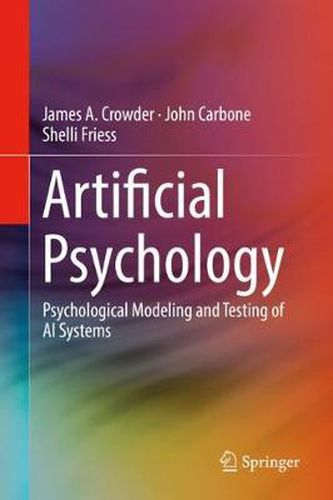Readings Newsletter
Become a Readings Member to make your shopping experience even easier.
Sign in or sign up for free!
You’re not far away from qualifying for FREE standard shipping within Australia
You’ve qualified for FREE standard shipping within Australia
The cart is loading…






This title is printed to order. This book may have been self-published. If so, we cannot guarantee the quality of the content. In the main most books will have gone through the editing process however some may not. We therefore suggest that you be aware of this before ordering this book. If in doubt check either the author or publisher’s details as we are unable to accept any returns unless they are faulty. Please contact us if you have any questions.
This book explores the subject of artificial psychology and how the field must adapt human neuro-psychological testing techniques to provide adequate cognitive testing of advanced artificial intelligence systems. It shows how classical testing methods will reveal nothing about the cognitive nature of the systems and whether they are learning, reasoning, and evolving correctly; for these systems, the authors outline how testing techniques similar to/adapted from human psychological testing must be adopted, particularly in understanding how the system reacts to failure or relearning something it has learned incorrectly or inferred incorrectly. The authors provide insights into future architectures/capabilities that artificial cognitive systems will possess and how we can evaluate how well they are functioning. It discusses at length the notion of human/AI communication and collaboration and explores such topics as knowledge development, knowledge modeling and ambiguity management, artificial cognition and self-evolution of learning, artificial brain components and cognitive architecture, and artificial psychological modeling.
Explores the concepts of Artificial Psychology and Artificial Neuroscience as applied to advanced artificially cognitive systems; Provides insight into the world of cognitive architectures and biologically-based computing designs which will mimic human brain functionality in artificial intelligent systems of the future; Provides description and design of artificial psychological modeling to provide insight into how advanced artificial intelligent systems are learning and evolving; Explores artificial reasoning and inference architectures and the types of modeling and testing that will be required to trust an autonomous artificial intelligent systems.
$9.00 standard shipping within Australia
FREE standard shipping within Australia for orders over $100.00
Express & International shipping calculated at checkout
This title is printed to order. This book may have been self-published. If so, we cannot guarantee the quality of the content. In the main most books will have gone through the editing process however some may not. We therefore suggest that you be aware of this before ordering this book. If in doubt check either the author or publisher’s details as we are unable to accept any returns unless they are faulty. Please contact us if you have any questions.
This book explores the subject of artificial psychology and how the field must adapt human neuro-psychological testing techniques to provide adequate cognitive testing of advanced artificial intelligence systems. It shows how classical testing methods will reveal nothing about the cognitive nature of the systems and whether they are learning, reasoning, and evolving correctly; for these systems, the authors outline how testing techniques similar to/adapted from human psychological testing must be adopted, particularly in understanding how the system reacts to failure or relearning something it has learned incorrectly or inferred incorrectly. The authors provide insights into future architectures/capabilities that artificial cognitive systems will possess and how we can evaluate how well they are functioning. It discusses at length the notion of human/AI communication and collaboration and explores such topics as knowledge development, knowledge modeling and ambiguity management, artificial cognition and self-evolution of learning, artificial brain components and cognitive architecture, and artificial psychological modeling.
Explores the concepts of Artificial Psychology and Artificial Neuroscience as applied to advanced artificially cognitive systems; Provides insight into the world of cognitive architectures and biologically-based computing designs which will mimic human brain functionality in artificial intelligent systems of the future; Provides description and design of artificial psychological modeling to provide insight into how advanced artificial intelligent systems are learning and evolving; Explores artificial reasoning and inference architectures and the types of modeling and testing that will be required to trust an autonomous artificial intelligent systems.